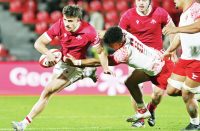 Eddie Jones had taken a long time to reacquaint himself with Cardiff since the Wallabies gave him the last rites for losing in rugby’s towering Notre-Dame beside the Taff.
Eddie Jones had taken a long time to reacquaint himself with Cardiff since the Wallabies gave him the last rites for losing in rugby’s towering Notre-Dame beside the Taff.
One wayward late kick in the most revered of all Europe’s rugby cathedrals 12 years ago guaranteed his dismissal as Australia coach six days later for committing the cardinal sin of losing to Wales. Back there last night, one wayward kick was all it took to get him out of the tightest corner of his England reign, like a latter-day Harry Houdini.
What goes around, comes around. Just as Mat Rogers’ missed conversion condemned the Aussies to one defeat too many for Jones, so Jonathan Davies’ misdirected clearance gave England the wherewithal to escape their Welsh Colditz.
Instead of finding a safe haven in touch, Davies’ in-goal punt fell like manna from heaven into the arms of George Ford, accelerating left through a veritable ocean of space. Two passes sent Elliot Daly cruising outside Alex Cuthbert and Wales ultimately had been turned over, ironically so, when they had outstripped England 8-2 at the breakdown.
There is a greater irony to be found in what happened some half an hour earlier. Ross Moriarty’s thunderous tackle on Owen Farrell two minutes into the second half was late but not that late and, to his credit, Jerome Garces resisted any temptation to go to the TMO.
Farrell, to his credit, took it on the chin without complaint, not that his mind would have been in a fit state to argue his case after being hit with thudding ferocity. That might have been the end of one match winner and the making of another.
For a while it looked that way before Farrell got back on his feet after a suitably long count. While the indestructible Wiganer returned to manning the barricades, Moriarty ensured Wales reached still higher levels of intensity during a period when they ought to have stretched their lead into double figures.
There were fleeting signs that recent history would repeat itself, that England would surrender a Grand Slam in Cardiff for the second time in four years. Mike Brown inexplicably conceded ground by kicking out on the full and Davies’ failure to take Rhys Webb’s pass probably changed the course of history.
Yet at the end, when Farrell’s touchline conversion left Wales needing a converted try and precious little time in which to get it, Moriarty had been taken off, a decision made all the harder to understand given the No.8’s dynamic effect.
England would have been relieved to see the back of him even if his exit cleared the way for as formidable a figure as Taulupe Faletau. It may have been pure coincidence but at round about that time England, five points down and no doubt grateful that it wasn’t more, began to turn the tide.
Faletau did nothing wrong but he had not played since Christmas Eve and sometimes there is no substitute for match fitness, however old-school that notion appears to have become in some coaching circles.
When the dust settles on a momentous occasion, Wales will find no comfort in playing a full part in a wonderful Test match and even less in ending up with one point, a losing one when they threatened to destroy the history book and hurl it, page by shredded page, back in English faces.
As Welsh performances go, it was their best in the Six Nations since the roasting of Stuart Lancaster‘s England four years earlier. In the days when he could do no wrong, Cuthbert scored both tries. Now, when little has gone right for him, he couldn’t stop Daly beating him on the outside.
Wales, ahead for virtually half the match thanks to Liam Williams’ stylish finish, failed thereafter to find the ruthless touch which explains why they are left to fight for third place and why England have won 16 in a row.
If they do go on to break the All Blacks’ world record in Dublin next month, winning there cannot possibly be any tougher than it was here. That the champions survived where so many previous English teams had perished is a tribute to their resilience, or ‘grit’ as Eddie Jones called it.
Seldom, if ever, during the 134 years since the old enemy first ventured across the Severn had Wales cranked the passion machine into such emotional overdrive. Alun-Wyn Jones, unlike any other captain in the long history of Anglo-Welsh conflict, felt it necessary to order the home fans to sing the anthem “as if it’s the last time you’re going to sing it”.
It was more a call to arms than an appeal. Lest there was any danger of it falling on deaf ears, Jones rammed the point home, that if another English chariot was to hit the buffers in Cardiff it would require a collective effort par excellence.
The commander-in-chief stopped short of pointing his finger Lord Kitchener-style but the message was of the same “your-country-needs-you” theme. “It’s not 23 on the park and 75,000 in the stands,” Jones said. “We are altogether. For those few minutes we are connected. It gives the team that extra edge.”























